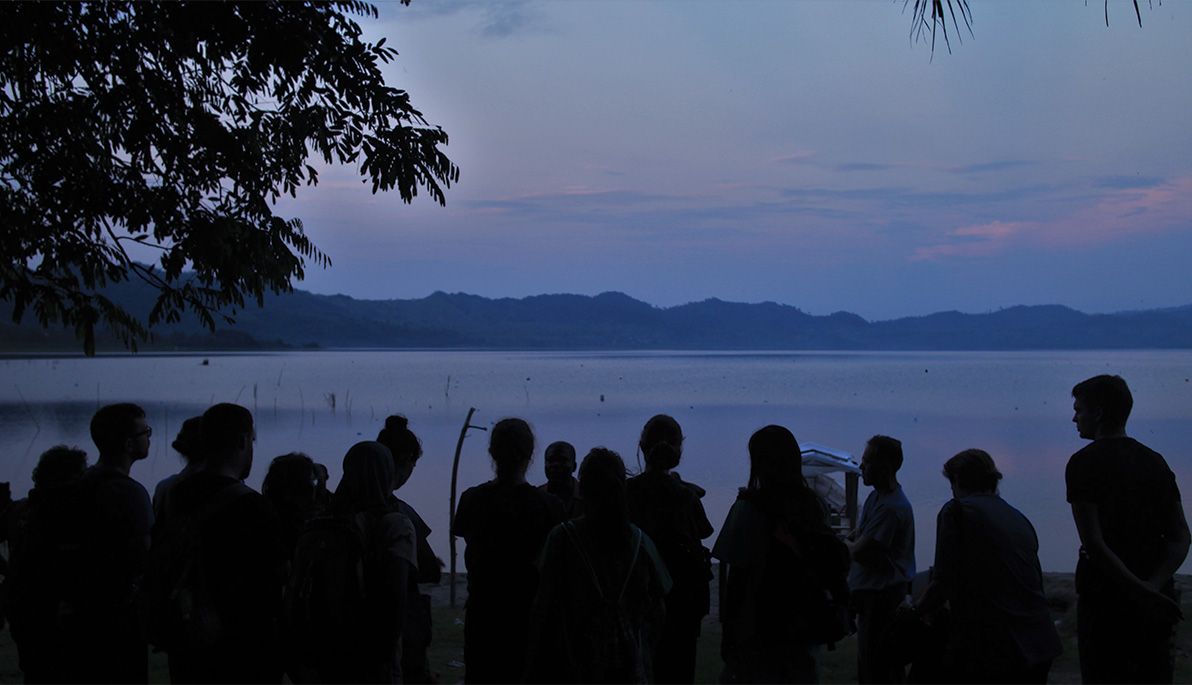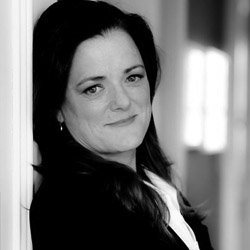News
Global Perspectives and Partnerships
November 14, 2017
What kinds of meaningful global experiences does NYIT offer? And how is NYIT developing these global partnerships, particularly at a time when many countries and organizations are undergoing periods of unrest? NYIT Magazine went to the sources to find out.
In June, NYIT staff and faculty members hosted educators from around the world at NYIT’s first Global Partnership Summit. Organized by the Office of Global Engagement, the three-day summit invited participants to discuss potential partnerships that could provide the most robust opportunities for students, including dual degree programs and student exchange.
Attendees represented Brazil, Costa Rica, the Dominican Republic, El Salvador, Honduras, Mexico, the United States, Lebanon, Turkey, and Sweden. “We invited these institutions because we can help each other through student exchange, research collaboration, or both,” said Emily Rukobo, executive director of Global Academic Programs and NYIT’s English Language Institute. “We want to roll up our sleeves and get to work on real collaborations.”
That kind of work is already underway at NYIT, where a commitment to providing a global education for students remains a top strategic initiative.
A Center for Global Health
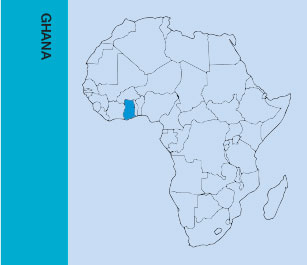
It’s June in Osiem, Ghana, and 16 students and faculty members from NYIT College of Osteopathic Medicine and School of Health Professions are stationed at Hawa Memorial Saviour Hospital conducting health screenings and community outreach for local residents. Over the next two weeks, the group will provide medical services to more than 500 patients, donate medical supplies, work alongside local healthcare professionals, and ultimately learn how medicine is practiced in areas with limited resources. It’s an experience that has the potential to shape the careers and lives of these physician trainees.
The Ghana trip, now in its sixth year, is one of several service learning initiatives hosted by the Center for Global Health. Established at NYIT in 2007, the center aims to provide opportunities for students and faculty members to engage in global health research, policy, and practice. This year, Lillian Niwagaba, Ph.D., who was named director of the Center in 2016, traveled to Ghana for the first time with the group, which included faculty members Michael Gindi, M.D., Janet Grotticelli (D.O. ’88), and Zehra Ahmed (B.S. ’04), M.B.B.S., PA-C.
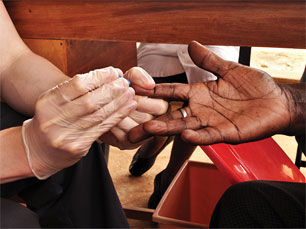
A student tests the blood sugar levels of a community member.
“It was a wonderful experience, especially seeing the excitement among the students—some of whom had never traveled outside the United States,” says Niwagaba. Originally from Uganda, she has dedicated her career to developing global health programs and collaborations in higher education. The center currently offers programs in countries including Ghana, Haiti, and Costa Rica, and students can travel to more countries through the Institute for International Medicine. At NYIT, she invites experts to speak to students so they will “dig deeper” and “not only apply what they’ve learned about healthcare on these service trips but also use their empathy and compassion when treating patients locally.”
See the students in Ghana.
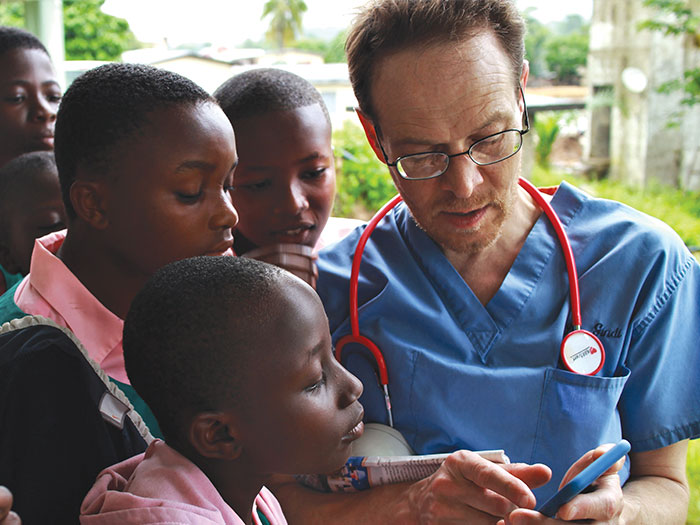
In Ghana, the Center for Global Health team was stationed at the Hawa Memorial Saviour Hospital. Faculty member Michael Gindi shares American culture with Ghanaian school children.
The Center for Global Health helps students with pre-trip orientations, but Niwagaba cautions that “we pay particular attention to prepare students, but it’s one of those lived experiences that students have to go through themselves to really get.” As part of the Ghana experience, for example, students worked at a women’s health clinic where they took patient histories and vitals and did breast exams. “Their enthusiasm was infectious,” says Niwagaba. “I could see them becoming doctors.”
Mastering Business in the Shadow of Mount Kilimanjaro
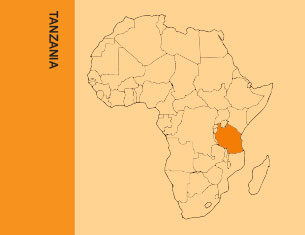
As students in the Center for Global Health wrapped up their trip, another group was preparing to head across the Atlantic Ocean. In August, six M.B.A. students, along with faculty and staff members, traveled to Moshi, Tanzania, in the foothills of Mount Kilimanjaro, to teach a business-focused curriculum to 44 female entrepreneurs. The women own a variety of businesses, including salons, farms, and day care services, which cater to locals and tourists in the area. The program was organized in collaboration with local Tanzanian NGO Excel Education Foundation (EEF).
Organized through the Business Development Institute, conceived of and run by Amr Swid, Ph.D., assistant professor and director of experiential education at NYIT School of Management, the women learned how to develop their skills as managers and entrepreneurs, create and implement a business plan, and more. Participants also took an intensive English language course taught by Rukobo and Jennifer Rubin, while students served as mentors and group leaders throughout the trip.
“It was a transformative experience for the students, the women they worked with, and for the faculty,” says Rukobo. “It’s one thing to study business concepts in a classroom, and it’s quite another to teach women about them in a second language. With a trip like this, students have a chance to leave the safe environment of NYIT and investigate the world.”
[Institutions] can help each other through student exchange, research collaboration, or both. We want to roll up our sleeves and get to work on real collaborations.
Emily Rukobo
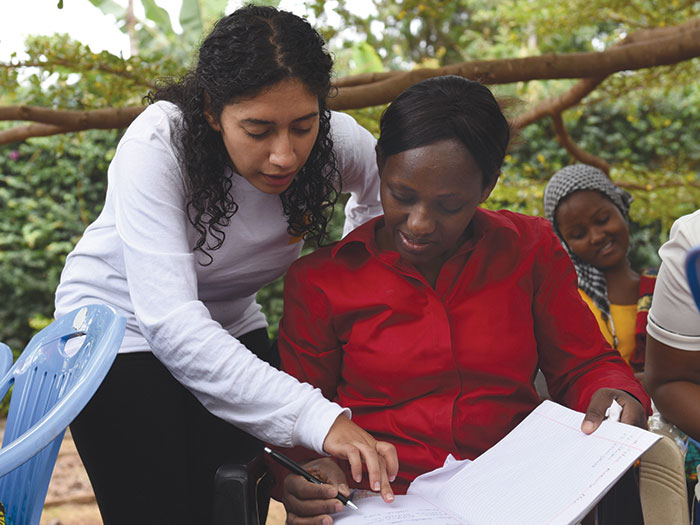
M.B.A. student May Sefin and local entrepreneur Beatrice Temba discuss business plan development at the Excel Education Foundation in Moshi, Tanzania.
“The Tanzania trip is a perfect example of how to learn by doing,” adds Swid. “These M.B.A. students gained experiential education when they invested their time and effort in teaching and applying their knowledge and skills to real-world problems.” Last year, Swid organized three additional study abroad experiences for School of Management students, including first-time trips to Dubai and Barcelona. The Barcelona trip, which took place over spring break, was a joint venture with Işık University in Turkey. More than 20 students from NYIT campuses in New York and Abu Dhabi and Işık University signed up to learn about doing business in emerging markets from guest speakers from the Universitat de Barcelona. Dubai also proved to be a place where students could learn about business in an unfamiliar setting. “Dubai has emerged as one of the world’s leading international business centers with easy accessibility, state-of-the-art infrastructure, and modern venues,” says Swid, who partnered with Multinational Business Academy in Delhi to launch the trip. The students went to the markets, visited Google and other multinationals, and, according to Swid, “fell in love with Dubai.”
M.B.A. student May Sefin, who went on the Tanzania trip, sums up the importance of these kinds of experiences perfectly: “The opportunity to assist people who are in need has made my experience visiting Tanzania unparalleled with any other. Something about being immersed in a foreign, unknown world puts absolutely everything into perspective.”
Parisian Prowlers
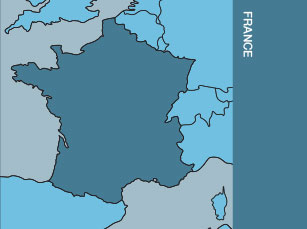
For nearly two decades, students from France have been coming to NYIT to study for a semester through EFAP (the French school L’école des nouveaux métiers de la communication). For the first 15 years, the program was one-sided, with French students studying in New York. Then, in 2015, Patricia Chaban, director of the EFAP program at NYIT and adjunct instructor of French, expanded the partnership; NYIT began sending students to France for a month to study documentary filmmaking and integrated marketing, visit creative agencies, and earn college credit. “This year, we brought 15 students from NYIT’s campuses in New York and Abu Dhabi and from NYIT’s M.B.A. program in China. We also had students from European universities,” says Chaban. “It was a mix of cultures and nationalities.”
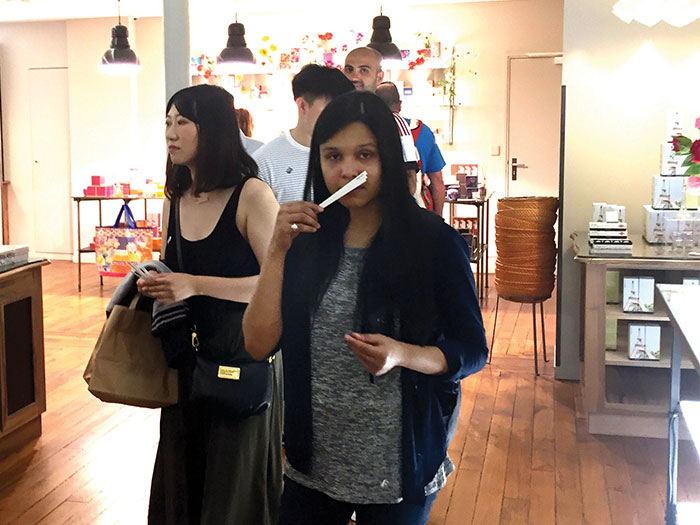
NYIT students studied in Paris this summer, thanks to a partnership with EFAP. As part of their experience, they visited locations including Montmartre, Galeries Lafayette, Louis Vuitton, the Palais Garnier, and Fragonard Perfume.
As with any travel, there are always surprises. This past summer, a student from NYIT-Manhattan and a student from NYIT-Abu Dhabi turned out to be from the same town in India. They found each other thanks to a mutual desire to study in Paris. “They were inseparable,” says Chaban. “They were studying at two campuses on the opposite side of the world but came from the same town. It is a nice story about the program. We wanted it to be really global, and it was.”
And Chaban is not done. She would like to grow the Paris program from a month to a semester, and she’s planning a two-week wine management course, which she thinks could appeal to NYIT students in the hospitality management program.
Engineering Across Borders
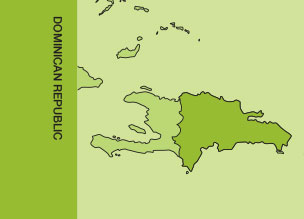
Soon after the global summit, an initiative was launched between the Instituto Tecnológico de las Américas (ITLA) in the Dominican Republic and NYIT School of Engineering and Computing Sciences. With the help of an Innovation Across Borders grant of $25,000, which supports an exchange program where students collaborate on design and innovation projects while experiencing new cultures, six ITLA students traveled to New York this fall and teamed up with NYIT students to respond to a design challenge based around medical devices. The grant was one of 14 awarded by the 100,000 Strong in the Americas Innovation Fund in honor of NAFSA’s retired Executive Director and CEO Marlene M. Johnson. “Working together, they will propose innovative solutions, develop prototypes, and work on business plans,” says Marta A. Panero, Ph.D., director of strategic partnerships at the School of Engineering and Computing Sciences. In the spring, the teams will continue to work on their project designs via virtual collaboration, and then in the summer, NYIT students will attend ITLA to finalize plans and identify marketing opportunities.
More opportunities are in development at the school. “We have just started to collaborate with FACENS’ Smart Campus in Sao Paolo, Brazil,” says Panero. “And in terms of other global partnerships, we are now working closely with the University of Applied Sciences at Hochschule für Technik Stuttgart, as well as the Austrian Institute of Technology on research of urban systems and related data and modeling frameworks.”
Ultimately, the goal is to design more efficient ways to manage critical infrastructure systems, leading to better water, energy, and food in cities across the globe.
Read more about the summit.
Global Education in a Time of Upheaval
While faculty and staff members are sending their students out into the world, the Global Partnership Summit successfully brought people from different institutions to NYIT to reinforce the importance of developing higher education opportunities at a time when many places are experiencing great unrest. Among the millions of people displaced from their homes are those who would be pursuing a university education under normal circumstances. That issue was the topic of discussion at the summit’s culminating plenary session, “Perspectives on Global Education,” which was held in partnership with the Institute of International Education (IIE), one of the world’s foremost organizations for helping displaced people find an institutional home.
According to a report by the U.N. High Commissioner for Refugees, just one percent of refugees attend university compared to 34 percent globally. In his keynote speech at the session, IIE President and CEO Allan Goodman said, “We don’t need further research to identify our problem or potential solutions. We know what the disease is, and we know what the cure is: The disease is a lost generation of young people between 18 and 24 who are qualified for higher education. Education is the cure.”
Continuing the conversation about refugees is important to Rukobo, and she sees ways for departments and schools across NYIT to help. For example, NYIT School of Architecture and Design students recently traveled to Berlin, Germany, where they developed refugee housing.
And there are more partnerships to explore. “We have strong relationships with Jordan, Bahrain, and the United Arab Emirates, and we have a strong connection with countries supporting refugees,” says Rukobo. Fostering these connections with institutions and organizations will continue to be a top priority for NYIT.
Whether students are in the United States or abroad, and whether they are treating patients, helping refugees, or building better businesses, they want to do so in a way that has real impact. By developing global partnerships, faculty and staff members will help ensure their success—now and in the future.
What’s in it for MOU?
An MOU (memorandum of understanding) is often the first step two organizations—such as two universities or a university and a public or private institution—will take in forming a partnership. For example, NYIT School of Interdisciplinary Studies and Education recently signed an MOU with the Bangladesh government Access to Information (a2i) program, which will establish academic exchanges between Bangladesh and NYIT and teacher training in Bangladesh in information and technology education.
JUFE: NYIT’S Longest Global Partnership
In 1998, NYIT took its brand of American-style education overseas with an M.B.A. program at Jiangxi University of Finance and Economics (JUFE) in China. The NYIT-JUFE M.B.A. program now enrolls more than 100 students each year, with classes offered in Beijing, Shenzhen, and Shanghai.
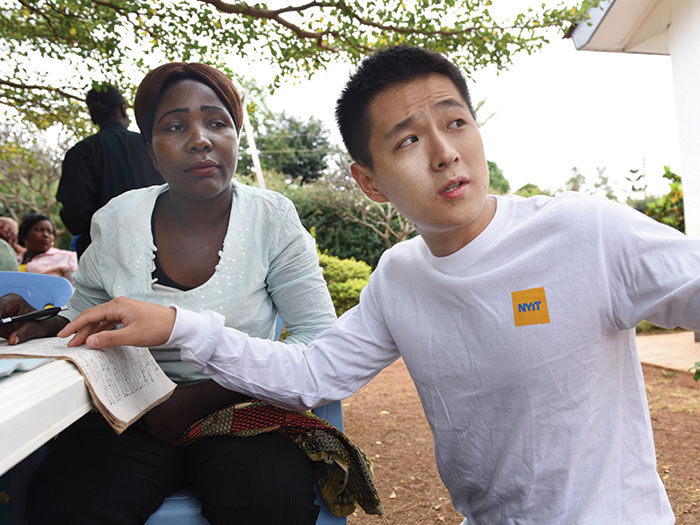
M.B.A. student Panfeng Liu (right) helps local entrepreneur Renalda Materu learn about conducting business in English at the Excel Education Foundation in Moshi, Tanzania.
This article originally appeared in the Fall 2017 issue of NYIT Magazine.
